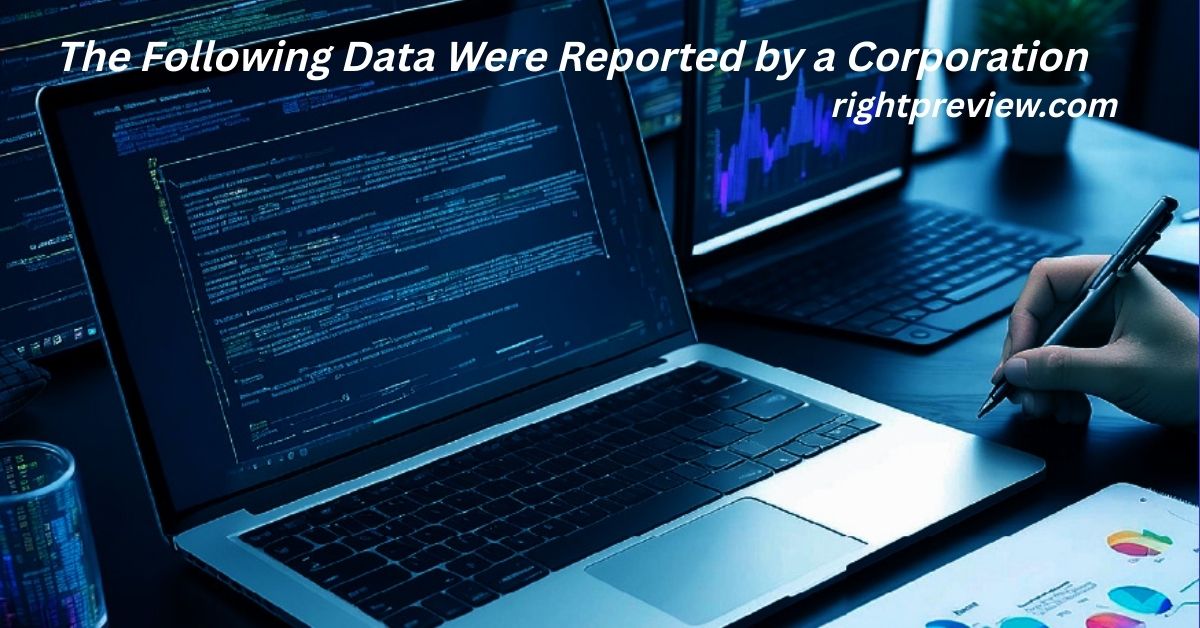In today’s business environment, corporations generate a vast array of data that plays a crucial role in decision-making, strategic planning, and performance evaluation. The importance of accurate data reporting cannot be overstated as it affects not only a company’s internal processes but also its relationships with external stakeholders, including investors, regulators, and the general public. The statement “the following data were reported by a corporation” is a phrase commonly used to introduce a range of business performance metrics, financial figures, and operational insights. In this article, we will explore the significance of corporate data reporting, the types of data typically reported by corporations, and the impact such data has on various aspects of a company’s operations.
The Role of Data in Corporate Reporting
Data reporting is essential for maintaining transparency, ensuring accountability, and fostering trust between a corporation and its stakeholders. Companies report data in various formats such as annual reports, quarterly earnings reports, sustainability reports, and financial statements. The primary goal of these reports is to provide stakeholders with the information they need to make informed decisions. Whether it’s investors deciding where to allocate funds or regulators ensuring compliance with legal standards, the data reported by a corporation serves as the backbone of corporate governance and operations.
For example, financial reports typically include income statements, balance sheets, and cash flow statements. These documents are essential for assessing a corporation’s financial health, understanding its profitability, and determining its future growth prospects. Similarly, non-financial data, such as employee diversity statistics, sustainability efforts, and corporate social responsibility (CSR) initiatives, also play an increasingly important role in how companies are perceived by the public.

Types of Data Reported by Corporations
Corporations report a wide range of data depending on the nature of their business and the specific requirements of their stakeholders. Below are some of the most common types of data that corporations report:
Also Read: Infector Virus: What It Is, How It Works & How to Protect Your Computer
- Financial Data:
- Income Statement: A summary of a corporation’s revenues, expenses, and profits over a specific period. This report gives insight into a company’s ability to generate profit and manage its expenses effectively.
- Balance Sheet: A snapshot of a corporation’s assets, liabilities, and equity at a given point in time. It provides valuable information about the financial position of a company.
- Cash Flow Statement: This report tracks the movement of cash in and out of the corporation, providing a clear picture of liquidity and the ability to cover expenses.
- Income Statement: A summary of a corporation’s revenues, expenses, and profits over a specific period. This report gives insight into a company’s ability to generate profit and manage its expenses effectively.
- Operational Data:
- Production Metrics: For manufacturing companies, operational data includes production output, supply chain performance, and inventory levels.
- Customer Metrics: Corporations also report on customer satisfaction, customer retention rates, and sales performance, which are critical for assessing market demand and business growth.
- Production Metrics: For manufacturing companies, operational data includes production output, supply chain performance, and inventory levels.
- Non-Financial Data:
- Sustainability Reporting: In recent years, there has been an increasing emphasis on environmental, social, and governance (ESG) reporting. Companies now report on their efforts to reduce their carbon footprint, promote sustainable practices, and address social issues.
- Employee Data: This includes workforce demographics, turnover rates, and diversity statistics. Companies report this data to demonstrate their commitment to inclusivity and employee well-being.
- Corporate Social Responsibility (CSR): Many corporations report on their charitable contributions, community outreach programs, and other CSR initiatives to highlight their positive impact on society.
- Sustainability Reporting: In recent years, there has been an increasing emphasis on environmental, social, and governance (ESG) reporting. Companies now report on their efforts to reduce their carbon footprint, promote sustainable practices, and address social issues.
- Compliance and Regulatory Data:
- Regulatory Filings: Corporations are required to submit various reports to government agencies to comply with tax laws, labor regulations, environmental standards, and industry-specific requirements.
- Audit Reports: External audits are conducted to ensure the accuracy and reliability of the financial data reported by a corporation. These audits are crucial for maintaining public trust and avoiding legal complications.
- Regulatory Filings: Corporations are required to submit various reports to government agencies to comply with tax laws, labor regulations, environmental standards, and industry-specific requirements.
How Corporate Data Influences Business Decisions
The data reported by a corporation influences both short-term and long-term business decisions. Below are some ways in which corporate data impacts various decision-making processes:
- Investment Decisions:
Investors rely heavily on financial reports and other data to assess a company’s growth potential, profitability, and risk factors. By analyzing income statements, balance sheets, and other metrics, investors can make decisions on whether to buy, sell, or hold shares in a corporation. - Strategic Planning:
Executives and management teams use corporate data to develop business strategies. For instance, sales and production data help managers identify which products are performing well and where to allocate resources for expansion. Similarly, customer data informs marketing strategies and product development decisions. - Risk Management:
Data related to regulatory compliance, environmental sustainability, and internal controls helps corporations assess potential risks. By reporting on these areas, companies can identify weaknesses in their operations and take proactive measures to mitigate risks. - Performance Evaluation:
Corporations often use reported data to evaluate their performance against industry benchmarks and competitors. Financial ratios, for example, are commonly used to compare profitability, liquidity, and solvency between companies in the same sector.
The Impact of Data Transparency
The increasing demand for transparency in corporate reporting has led to stricter regulations regarding data reporting. In the U.S., the Securities and Exchange Commission (SEC) enforces rules that require publicly traded corporations to disclose certain financial and operational data regularly. These regulations aim to protect investors and ensure that corporations are honest and transparent about their financial health.
Also Read: Tikcotech: The All-in-One App for Managing Apps, Playing Games, and Listening to Music
Transparency in reporting can also enhance a corporation’s reputation, foster trust with stakeholders, and create a competitive advantage. Companies that are transparent about their financial performance and sustainability efforts are more likely to attract investors, customers, and employees who value integrity and accountability.
Common Challenges in Corporate Data Reporting
While data reporting is critical for corporations, there are several challenges companies face when reporting data. These challenges can affect the accuracy and reliability of the information presented:
- Data Quality and Accuracy:
One of the biggest challenges in corporate data reporting is ensuring that the data is accurate and free from errors. Inaccurate data can lead to wrong business decisions, legal issues, and damage to a company’s reputation. - Data Privacy Concerns:
With the rise of digital data collection, corporations must ensure they comply with data protection regulations such as the General Data Protection Regulation (GDPR) and the California Consumer Privacy Act (CCPA). Mismanagement of customer data can result in fines and loss of customer trust. - Data Overload:
As corporations collect more data than ever before, managing and analyzing that data can become overwhelming. Companies must invest in data analytics tools and technologies to make sense of large volumes of data and extract actionable insights. - Regulatory Compliance:
Navigating the complex landscape of local, national, and international reporting requirements can be difficult for corporations. Failing to comply with these regulations can lead to legal issues, fines, and reputational damage.
Future Trends in Corporate Data Reporting
As technology continues to evolve, so too will the ways in which corporations report data. Below are some future trends to watch in the realm of corporate data reporting:
- Automation and AI in Reporting:
Many corporations are turning to artificial intelligence (AI) and automation to streamline the data reporting process. AI-powered tools can help companies analyze large datasets, identify trends, and generate reports faster and more accurately. - Real-Time Reporting:
The demand for real-time data is growing, especially in fast-paced industries like technology and finance. Companies are increasingly using cloud-based platforms and data visualization tools to provide stakeholders with up-to-date information at any time. - Integration of Non-Financial Data:
As environmental, social, and governance (ESG) concerns become more important, corporations will increasingly integrate non-financial data into their reporting. This will help stakeholders understand not only a company’s financial performance but also its impact on society and the environment. - Blockchain for Data Transparency:
Blockchain technology has the potential to revolutionize corporate data reporting by providing a secure, transparent, and tamper-proof way of tracking and verifying data. This could significantly reduce fraud and enhance the credibility of corporate reports.
FAQs about The Following Data Were Reported by a Corporation
Why is data reporting important for corporations?
Data reporting allows companies to maintain transparency, build trust with stakeholders, and make informed decisions that drive growth and profitability.
What are the main types of data that corporations report?
Corporations typically report financial data, operational data, non-financial data such as sustainability and employee metrics, and compliance-related data.
How does corporate data impact investors?
Investors use corporate data, especially financial reports, to assess the profitability and growth potential of a company, influencing their investment decisions.
What are the challenges faced by companies in data reporting?
Challenges include ensuring data quality, managing data privacy concerns, handling large volumes of data, and complying with complex regulatory requirements.
What future trends are shaping corporate data reporting?
Future trends include the use of AI for reporting automation, real-time data access, integration of non-financial data, and blockchain for increased transparency.
Conclusion
The following data were reported by a corporation is more than just a statement; it represents a critical aspect of corporate governance, decision-making, and stakeholder communication. By understanding the different types of data reported, the challenges involved, and the emerging trends in corporate data reporting, businesses can better navigate the complexities of data management. The importance of transparent, accurate, and timely data reporting cannot be overstated as it is fundamental to building trust, ensuring compliance, and driving business success in the modern world.




